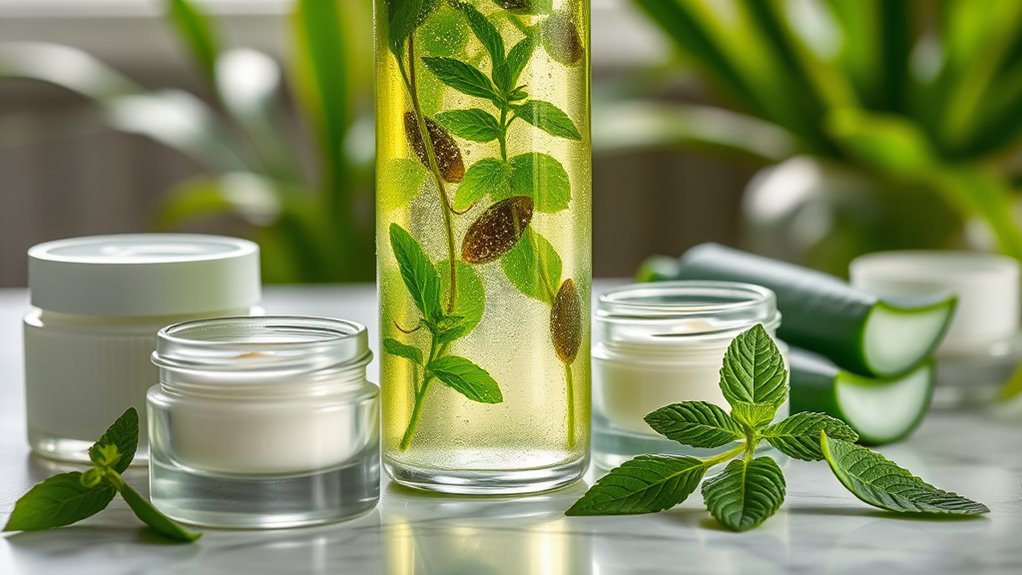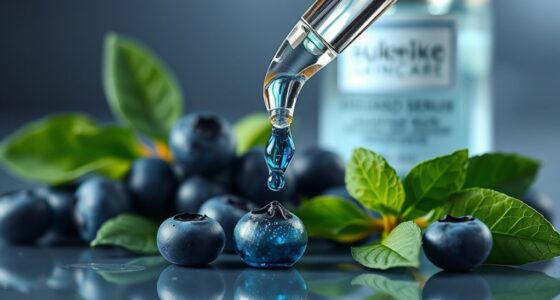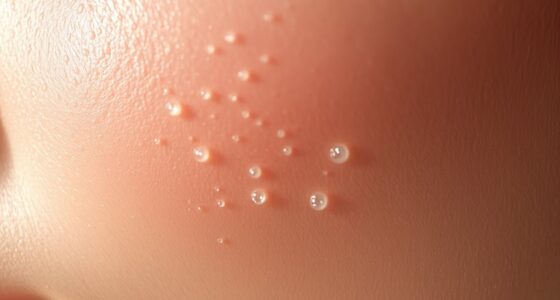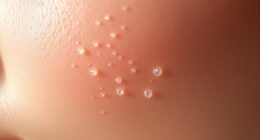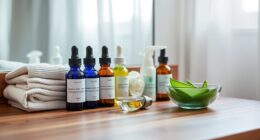Drinking water is crucial, but it’s not enough for your skin’s hydration. Internal hydration comes from a balanced diet rich in healthy fats and antioxidants, while topical treatments are key for maintaining moisture. Use moisturizers with hyaluronic acid and ceramides, and don’t forget gentle exfoliation to enhance absorption. Incorporating lifestyle tweaks, like using a humidifier and limiting hot showers, can help too. Discover more effective hacks to supercharge your skin’s hydration.
Key Takeaways
- Drinking water alone doesn’t directly hydrate skin; a balanced diet is essential for promoting skin health and hydration from within.
- Topical products with hyaluronic acid and glycerin are crucial for enhancing skin hydration and maintaining the moisture barrier.
- Exfoliation allows for better absorption of moisturizers, but over-exfoliating can strip essential oils and hinder hydration.
- Environmental factors like dry air and hot showers can deplete skin moisture, making it vital to use humidifiers and gentle cleansers.
- Incorporating nutrient-rich foods and antioxidants into your diet supports skin health, complementing topical hydration efforts for optimal results.
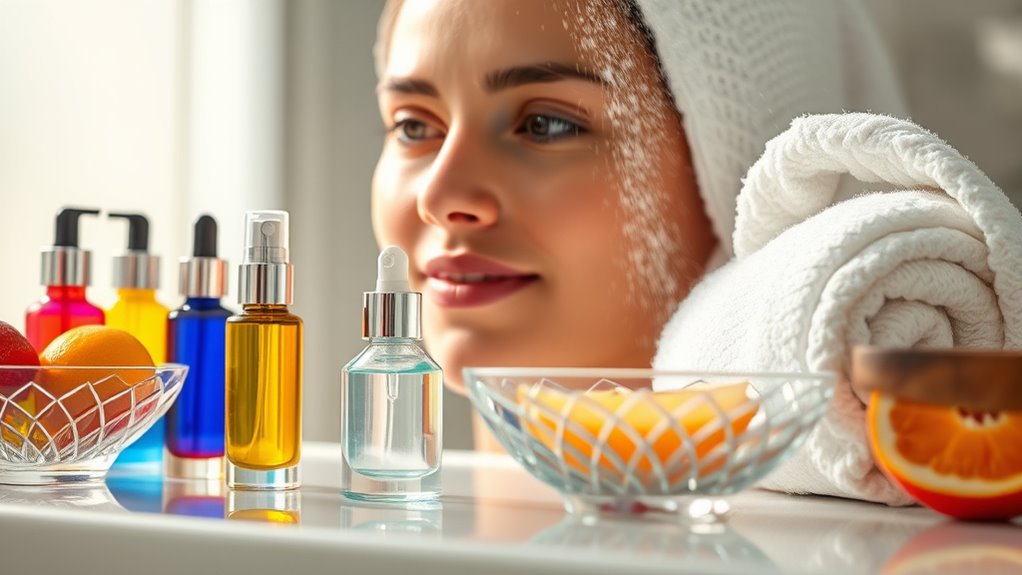
When it comes to keeping your face hydrated, understanding both internal and external methods is key. You might think that drinking water is all it takes, but there’s so much more to effective hydration. While water intake is vital for your body’s overall functions, it doesn’t directly hydrate your skin. Instead, think of it as a support system. Drinking enough water helps your body function properly, which indirectly promotes better skin hydration.
To truly optimize your skin’s moisture levels, you need to incorporate topical hydration techniques. Applying moisturizers containing hyaluronic acid or glycerin can significantly enhance hydration. These ingredients work by attracting water to your skin, ensuring it stays plump and dewy. Additionally, using facial serums and lotions with ceramides helps restore and maintain your skin barrier, protecting against moisture loss. It’s essential to include humectants like hyaluronic acid in your routine to maximize hydration. Cacao’s health benefits include antioxidants that can also contribute to skin health. Regularly using essential oils like lavender and eucalyptus can further enhance your skin’s hydration and overall wellness. Including protein-rich options like Greek yogurt in your diet can also support skin health from the inside out.
Don’t forget about exfoliation; using products with glycolic or lactic acid allows your skin to absorb moisturizers more effectively. A balanced diet plays its part too. Consuming water-rich fruits and vegetables can elevate your hydration levels, while antioxidants help combat skin damage. Foods high in healthy fats, like omega-3s, are crucial for skin cell health. Be mindful of caffeine and alcohol as they can lead to dehydration. Instead, focus on nourishing your body with wholesome foods and plenty of water.
On the lifestyle front, your environment can significantly impact your skin’s moisture levels. Using a humidifier can add moisture to dry air, particularly in winter months. Limiting hot showers helps preserve your skin’s natural oils, which are essential for hydration. Always protect your skin from direct sunlight with sunscreen, as UV rays can lead to dehydration and skin damage.
Adjusting your skincare routine can also make a difference. Incorporating sheet masks once a week can boost hydration levels, while thermal water sprays provide instant relief. Use gentle cleansers to maintain your skin’s natural moisture and avoid over-exfoliation, which can strip away essential oils. When applying makeup, look for products that contain moisturizing ingredients to enhance hydration throughout the day.
Lastly, lifestyle changes matter. Engaging in regular physical activity improves circulation, while managing stress promotes skin wellness. Prioritizing adequate sleep allows your skin to regenerate, ensuring you wake up with a more hydrated appearance. By combining these internal and external methods, you’ll maximize your skin’s hydration and achieve that radiant, youthful glow.
Frequently Asked Questions
Can Diet Affect My Skin’s Hydration Levels?
Yes, your diet can significantly affect your skin’s hydration levels.
When you consume water-rich foods like fruits and vegetables, you boost your skin’s moisture from within. Whole, natural foods provide essential nutrients that support skin health, while refined carbs and sugars can lead to inflammation, negatively impacting hydration.
A balanced diet, combined with proper hydration, helps maintain vibrant, healthy skin.
How Often Should I Reapply Moisturizer?
You should reapply moisturizer based on your skin type, lifestyle, and environmental factors.
If you’ve got dry skin, consider applying it more often. After showering or washing your face, always apply moisturizer to lock in moisture.
In dry climates, you might need extra applications throughout the day. Pay attention to how your skin feels; if it’s tight or dull, it’s time to reapply.
Consistency helps keep your skin healthy and hydrated.
Are There Specific Ingredients to Look for in Hydrating Products?
When you’re searching for hydrating products, look for ingredients like hyaluronic acid and glycerin, which attract moisture to your skin.
Ceramides are great for reinforcing the skin barrier, while urea offers both hydration and gentle exfoliation.
Oils like shea butter and coconut oil provide additional moisture and protection.
Always check labels for humectants, as they play a crucial role in keeping your skin plump and hydrated throughout the day.
Does the Climate Impact My Skin’s Hydration Needs?
Absolutely, the climate does impact your skin’s hydration needs.
If you think your skin stays the same regardless of weather, you’re mistaken. In dry or cold conditions, your skin loses moisture more quickly, so you’ll need richer moisturizers.
Conversely, in humid environments, lightweight products are essential.
You’ve got to adapt your routine based on these changes to maintain optimal hydration and keep your skin healthy.
Stay attentive to your environment!
How Can I Tell if My Skin Is Dehydrated?
To tell if your skin is dehydrated, look for signs like dryness, increased wrinkles, a dull complexion, or itchiness.
You can perform the pinch test; if your skin doesn’t spring back quickly, it’s likely dehydrated.
Also, check for dark under-eye circles.
If you notice these symptoms, it’s a good idea to adjust your hydration habits and consider using hydrating products to restore moisture and improve your skin’s appearance.
Conclusion
So, while you might think gulping down gallons of water is the ultimate solution for a glowing face, let’s be real—your skin isn’t a houseplant. It needs more than just hydration; it craves a buffet of nutrients and TLC. Slather on those serums, embrace oils, and don’t forget the sunscreen! After all, if your skin could talk, it’d probably demand a spa day instead of just another glass of water. Cheers to your complexion’s culinary adventures!
